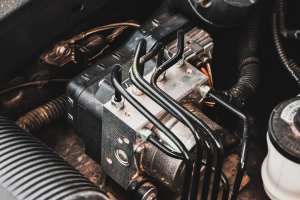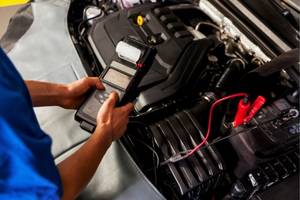Introduction
Imagine cruising along a picturesque route, the wind in your hair, when suddenly your car starts acting up. It's not the engine or the tires—it’s the Powertrain Control Module (PCM), the brain of your vehicle. When this happens, finding a reliable PCM repair service becomes essential. This guide will navigate you through the important aspects of PCM repair services, offering valuable tips and best practices to make sure your car is swiftly and effectively restored to ideal performance.
1. PCM Repair Service: An Overview
The PCM, or the car's brain as some like to call it, is the control center for most of the electrical systems in your car. When it fails, a PCM repair service is often your best bet. They've got the tools, the know-how, and the experience to get your car's brain back in tip-top shape.
A PCM repair service requires several steps. It starts with diagnosing the problem—tools like an OBD-II scanner are commonly used to read the PCM's error codes. Next comes the actual repair. This means replacing faulty capacitors, resoldering loose connections, or even replacing the entire PCM unit if necessary.
Once the repair is done, the PCM needs to be reprogrammed to work with your particular vehicle. This step is important—it's like teaching the PCM to speak your car's language. Finally, the PCM is reinstalled in your car, and you're good to go!
There's no one-size-fits-all when it comes to PCM repair services. Some services specialize in specific car makes and models, while others are more of a jack-of-all-trades. The key thing is to find a PCM repair service that knows their stuff and can get your car back on track.
Remember, your vehicle's performance is broadly dependent on the health of your PCM. So, when you start experiencing issues, don't delay to seek out a professional PCM repair service. They're the brain surgeons of the automotive world, after all. Stay tuned for the next sections where we'll dive right into the steps to follow for effective PCM repair, tips to enhance the efficiency of the process, and the best practices in the industry.
2. Steps to Follow for Effective PCM Repair
Alright, let's get down to business. You've identified the problem—it's the PCM—and you've chosen a dependent PCM repair service. So, what's next? Let's walk through the steps that a skilled technician will typically follow when undertaking a PCM repair.
Step 1: Diagnose the Issue
Before you can fix anything, you need to know what's wrong. PCM experts will use advanced diagnostic tools, like an OBD-II scanner, to read error codes from your vehicle's computer system. This diagnostic process is the first step in any PCM repair service, as it helps finding exactly what's causing the issue.
Step 2: Conduct the Repair
Once the problem has been identified, it's time to get to the work. The technician will conduct the necessary repairs, which may range from replacing faulty capacitors, to resoldering loose connections. In more severe cases, it might even involve replacing the entire PCM unit.
Step 3: Reprogram the PCM
After the repairs have been completed, the next step is to reprogram the PCM to work with your specific vehicle. Think of it as teaching your PCM a new language—the language of your car. This is an important stage in the PCM repair service, as it makes sure that the repaired PCM effectively communicates with the rest of your vehicle's systems.
Step 4: Reinstall the PCM
Finally, the repaired and reprogrammed PCM is reinstalled in your vehicle, and voila! You're back on the road again.
In the next section, we'll share some tips to improve the efficiency of PCM repair. So tighten your seats and get ready to learn!
3. Tips to Enhance the Efficiency of PCM Repair
Alright, now that we've got the basic steps of a PCM repair service down, let's talk about how you can make the repair process even more smoother. Here are some tips to improve the efficiency of your PCM repair.
Tip 1: Don't Skip the Diagnostics
It might be fascinating to rush in and start replacing components, but remember—diagnostics are key. By taking the time to correctly diagnose the issue, you can save yourself from repairs and expenditures that are not required. Let your PCM repair service provider take the lead here. They're the experts, after all!
Just like you wouldn't use a hammer to fix a watch, you shouldn't use the wrong tools for PCM repair. A high-quality OBD-II scanner, a soldering iron, and an EEPROM programmer are just a few examples of the specific tools used in a professional PCM repair service.
Tip 3: Trust the Professionals
Sure, you could try to fix the PCM yourself. But unless you're a trained technician, it's best to trust the professionals. They have the necessary skills, the tools, and the experience to get your PCM fixed and get you back on the road, fast.
Tip 4: Keep Your PCM Clean
A dirty PCM is the one that's more likely to fail. Keeping your PCM clean and protected from the things that can go a long way toward preventing future issues. Some PCM repair services even offer a cleaning service as part of their package.
And there you have it! These tips should help improve the efficiency of your PCM repair, saving you time and possibly even money. Up next, we'll cover some best practices in PCM repair service. So, stay tuned!
4. Best Practices in PCM Repair Service
Now, let's drive onto the best practices in our world of PCM repair service. There are several things that the professionals do that set their work apart, and these are practices that you should look out for when choosing a service.
Practice 1: Thorough Testing
Any reputable PCM repair service will conduct ample testing before and after the repair. This includes bench testing the PCM to make sure it's functioning correctly. This isn't an area where you want to see corners being cut!
Practice 2: Quality Parts
The use of high-quality parts is another authentication of an exceptional PCM repair service. If you see a service that's using cheap, low-grade parts, consider it a red flag. The quality of the components is key to the long life of your PCM.
Practice 3: Warranty Offered
A best practice for any PCM repair service is to offer a warranty on their work. This shows that they stand behind their repairs and are confident in their abilities. It also gives you mental peace knowing that if there are any issues down the line, you're covered.
Practice 4: Excellent Customer Service
Lastly, is excellent customer service. A good PCM repair service will keep you informed about the progress of the repair and be responsive to any questions or concerns you may have. Remember, great customer service is often a reflection of the quality of the work done.
Making sure that these best practices are followed will guarantee a PCM repair service that is not only efficient but also genuine. So, the next time you're looking for a PCM repair service, keep these points in mind. They could make all the difference between a frustrating experience and a smooth, stress-free repair.
Conclusion
The Powertrain Control Module (PCM) is an essential component of your vehicle, acting as its central nervous system. When it malfunctions, seeking a professional PCM repair service is your best bet. By understanding the steps involved in PCM repair, implementing efficiency tips, and identifying best practices, you can make sure there’s a smooth and effective repair process. Remember, the right service can transform a frustrating problem into a smooth fix, getting you back on the road with confidence.
FAQs on
Comprehensive Guide on PCM Repair Service in 2025 : Steps, Tips, and Best Practices
-
1. What is a Powertrain Control Module (PCM) and why is it important?
Ans.
The PCM is essentially the brain of your vehicle’s engine and transmission systems. It manages and monitors engine performance, fuel efficiency, and emissions. A malfunctioning PCM can lead to poor performance, increased emissions, or even complete engine failure, making its repair important for your vehicle’s ideal operation.
-
2. How can I tell if my PCM needs repair?
Ans.
Common signs of a faulty PCM include engine misfires, poor acceleration, decreased fuel efficiency, or the illumination of the check engine light. If you notice these symptoms, a diagnostic test using an OBD-II scanner can confirm whether the PCM is at fault.
-
3. What does the PCM repair process involve?
Ans.
PCM repair typically involves diagnosing the issue using diagnostic tools, repairing or replacing faulty components, reprogramming the PCM to match your vehicle’s specifications, and reinstalling it. Each step makes sure that the PCM communicates effectively with your vehicle’s systems.
-
4. How long does a PCM repair take?
Ans.
The duration of a PCM repair can vary depending on the complications of the issue. Simple repairs might be completed in a few hours, while more serious repairs or replacements could take a day or more. It’s best to consult with your repair service for an estimated timeline.
-
5. Are there any preventive measures to avoid PCM issues?
Ans.
To prevent PCM problems, keep your vehicle’s electrical system in good condition, avoid exposing the PCM to excessive moisture or dirt, and ensure regular maintenance. Some repair services also offer cleaning services for the PCM, which can help prevent future issues.
-
6. What should I look for in a PCM repair service?
Ans.
Choose a PCM repair service that offers thorough diagnostics, uses high-quality parts, provides a warranty on their work, and demonstrates excellent customer service. A reputable service will make sure the PCM is repaired correctly and your vehicle's performance is restored.


